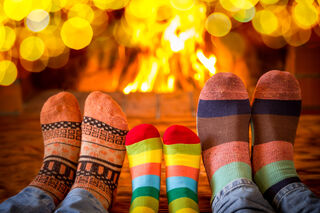Friends
The Holidays This Year: 9 Tips for a Post-Pandemic Celebration
This year we can apply what we have learned from the pandemic.
Posted November 16, 2022 Reviewed by Vanessa Lancaster
Key points
- The experience of the pandemic, along with other national and global concerns, has influenced how we may experience the season.
- During the holidays, remember to self-care and reflect on the value of social-emotional learning, and on how we learned to live with less.
Here we are as in olden days
Happy golden days of yore
Faithful friends who are dear to us
Gather near to us once more
—Have Yourself a Merry Little Christmas. Blane & Martin, 1943
It seems like yesterday.
As we kick off the 2022 holiday season, we are, for the most part, about to experience a relatively “normal” holiday season. Although many are still getting COVID, with the advent of vaccines and oral treatments, we are once again dining out, going to sporting events, commuting to work and school, and, yes – planning our upcoming holiday family travel schedules and gatherings.

While there are still fears of new strains and new pandemics raising feelings akin to PTSD, for now, many have now resumed a sense of normalcy.
In many ways, the experience of the pandemic, along with other national and global concerns, have influenced how we may experience the season. From a psychiatric perspective, let’s draw on all we’ve learned over these past years to help make this season bright and reflective.
The Holidays in a New Era: Family Tips
1. Make the holidays collaborative. When the pandemic caused us to stay home from work, school, and public places, we thought it was like a snow day, but we soon learned it was far from it! We found there was more to do than just sit back and relax. Balancing work, schoolwork, chores, childcare, and all sorts of tasks took more time, effort, and planning.
Yet, many families used collaboration as a real skill set to get all the necessities done. For this holiday season, let’s apply what we learned from the pandemic and collaborate. Ideas can range from assigning tasks to sharing responsibilities, such as cooking, decorating, and shopping – all this will generate feelings of contributing and closeness. Isn’t that what the holidays are for?
2. Don’t forget self-care. Many of us learned the value of self-care, such as exercise, diet (and not reaching for the carbs or substances to quell negative feelings), meditation, yoga, and taking breaks to listen to music or read. These are activities that families can do together during the holidays.
Many communities have turkey trots, Santa runs, community-sponsored ice-skating, holiday lightings, parks, reservoirs, etc. Plan time to get outside together because it promotes health and feelings of well-being. I promise it’ll help bring in the holiday cheer.
3. Value spending time with family and friends. Loneliness skyrocketed during the pandemic. I don’t remember when being distant from friends and loved ones were so common and distressing. Don’t take your close social relationships for granted! Plan to see them in person or through digital media, which has proven to be a lasting positive transformation as a result of the pandemic. Be creative and use any means possible to maintain social connections. Remember, we humans are pack animals. We need each other.
4. Remember you are more resilient now. We learned a great skill set over the pandemic. With so much being taken away from us during the pandemic, we learned to be more resilient. We found ways of accepting loss, even the tragic loss of loved ones.
We often took our treasured time with friends and relatives and meeting in groups for granted. Our kids lost time playing sports, missing ceremonial events like the prom and graduation, and we had to cope with giving up family outings, hanging out with our friends, and going on even short vacations. This season remember the many losses we endured during the pandemic and make up for lost time. The important thing is that we came out with a new perspective, endurance, and resilience. Let’s not forget this during the holidays.
5. Have conversations about the pandemic. One way to focus on the things we took for granted, our losses, and the social-emotional impact of the pandemic is to have conversations about our experiences during the height of the pandemic. During the holidays, talk with your kids, your partner, relatives, and friends about what was lost, how you coped, what you learned about yourself, and how grateful you are for the new freedom you can enjoy. Make this a centerpiece at your family dinners. The holidays should be a time for reflection and shared narratives.
6. Reflect on the value of social-emotional learning. In all my years as a child and adolescent psychiatrist, I have never heard as much emphasis on the importance of social-emotional learning in school for our kids.
Ten years ago, it was rare to hear complaints about lost time for garnering social skills, fostering inclusion, managing emotions in peer groups, the value of empathy, taking responsibility for one’s actions and their impact on others, and rational decision-making. These critical skills are now mandated in many, if not all, our schools.
This year during the holidays, reflect with your kids on what they missed and why those experiences are important. The great news is that our brains are wired to be “plastic.” This means that whatever is missed in development can be made up. Development of all skills – academic, social, emotional, and athletic is not lost; rather, they are simply delayed. We always have a second chance. Talk with your kids about how they will be doing their make-up work during the holidays.
7. Reflect on how we learned to live with less. During the pandemic, we were forced to give things up – going out to dinner, shopping, earning less, and getting by with more basic meals. And now, given the serious economic downturn, we can use the lessons we learned from the pandemic. This naturally brings us to the fact that the holidays, from Black Friday through Christmas, have been commercialized – more food, more presents, bigger trees. The costs of most products have escalated.
But during the pandemic, we learned to live with less, so why not now? And beyond living within our means, perhaps we should reflect on how we overdid things in the past. Too much was never enough. In my family, prior to the pandemic, we came to this realization and collectively rejected the mountains of presents. Every family member picked a name out of a hat, and we had ONE person to gift a special present. It worked. No one complained. (And if anyone did, someone would quote the Rolling Stones: “You can’t always get what you want, but you get what you need.”) No one needs more than one special present.
8. Engage in conflict resolution. Invariably the pandemic brought about conflicts. Conflicts invariably developed with much of our family in one place, including young adults who had to return from college. How did you resolve them? Are there residual resentments now? I know the holidays are generally a time to put negative feelings aside, but the post-pandemic holidays may be an excellent time to set things straight.
9. Immerse yourself in creative arts. The holidays traditionally bring arts into our homes – music, decorations, and creative meals. The arts are a superb way for all of us, particularly families, to process feelings, and have a deeper understanding of each other. Now is the time to bring the arts into communal experiences. Make music together, share a playlist or two, and create a collage with others that express how you are feeling now or how you felt during the pandemic.
Let’s take the time during the holidays to celebrate what we have learned and endured and appreciate each other’s differences. It will help make this year’s holiday season even brighter.
A version of this post was published at The Clay Center for Young Healthy Minds at The Massachusetts General Hospital.




